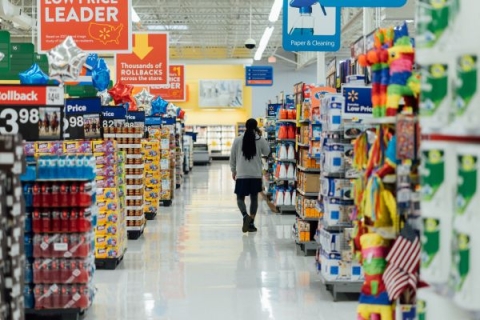

The new report shows that the supermarkets’ business model is surprisingly fragile
16 December 2021
4 min read
In the run-up to Christmas, supermarkets and their supply chains will be top-of-mind for many consumers. A new report from the Food Research Collaboration, based on analysis by Professor Lisa Jack from the University of Portsmouth, shows that the supermarkets’ business model is surprisingly fragile.
What if supermarkets’ famously cheap prices weren’t simply a matter of ‘economies of scale’? A look at the research from the past 60 years suggests that this classic model doesn’t really work for the supermarkets. Professor Jack’s investigation finds that the business model of supermarkets is on a knife edge: tiny, and heavily protected, profit margins applied to large volumes of goods keep the system running. Consumers benefit from a near endless array of cheap food, but the system is left in a balancing act that could easily go awry.
The new report, The secrets of supermarketing: A model balanced on a knife-edge, by Professor Jack from the University’s Faculty of Business and Law, finds that adding scale actually adds to supermarkets’ expenses. In other words, supermarkets face the costs of running their businesses (stock, premises, IT systems, staff, enticing displays, sophisticated logistics), but need to keep prices down to remain attractive to consumers and keep them coming through the door. The supermarkets therefore keep prices low by enticing customers to buy additional items and by looking to their suppliers to keep costs down. Bargaining power is the one real advantage that size and scale give the supermarkets but it risks putting financial and emotional burdens onto their suppliers.
The purpose of my research is not to bash the supermarkets. But it does raise important questions about how such a finely balanced model can make the big changes that may be necessary – and are often demanded by campaigners – to achieve a more sustainable food system.
Professor Lisa Jack, Faculty of Business and Law
Professor Jack, one of the few accountancy academics to focus on the food system, finds that one way supermarkets keep costs low is by charging suppliers fees for marketing and selling their products, generating ‘commercial income’ which can equal or exceed supermarkets’ bottom-line profits. Without the commercial income generated by charging supplier fees, British supermarkets would be running at or near a loss.
This supermarketing model of low prices, wide choice, expert marketing and slim margins, although finely balanced and expertly run at the supermarket end, risks unbalancing the rest of the food system: the supermarkets’ business model has unintentionally left us with a food system characterised by over-purchasing, over-eating, over-production and waste. Food is transferred to store cupboards in consumers’ homes and then left unused; empty calories are stored in our bodies; and edible food goes into bins.
Professor Jack said: “Supermarkets have been fantastically successful by selling what are called ‘bundles of convenience’ to shoppers – low prices, convenience and even entertainment. The purpose of my research is not to bash the supermarkets. But it does raise important questions about how such a finely balanced model can make the big changes that may be necessary – and are often demanded by campaigners – to achieve a more sustainable food system.”
This timely research warns us that our apparently powerful and reliable supermarket system may be more fragile than we think. In a ‘false economy of scale’, many of the major retailers now depend for their profitability on passing costs and anxiety onto their suppliers.
Dr Rosalind Sharpe, Director of the Food Research Collaboration
Dr Rosalind Sharpe, Director of the Food Research Collaboration, said: “This timely research warns us that our apparently powerful and reliable supermarket system may be more fragile than we think. In a ‘false economy of scale’, many of the major retailers now depend for their profitability on passing costs and anxiety onto their suppliers.
“Campaigners and policy-makers urge the big retailers to change the way they do business. But we know this would be hugely challenging. Asking supermarkets to reform – by paying higher prices to suppliers, stocking fewer options, or charging higher prices to consumers – would effectively be asking them to ‘unsupermarket’ themselves.“Could the food system withstand the upheaval? Do consumers want it? Would policy-makers risk it? We need to face up to these questions, as we try to envisage and move closer to a more climate-friendly, healthy, regenerative and equitable food system.”
